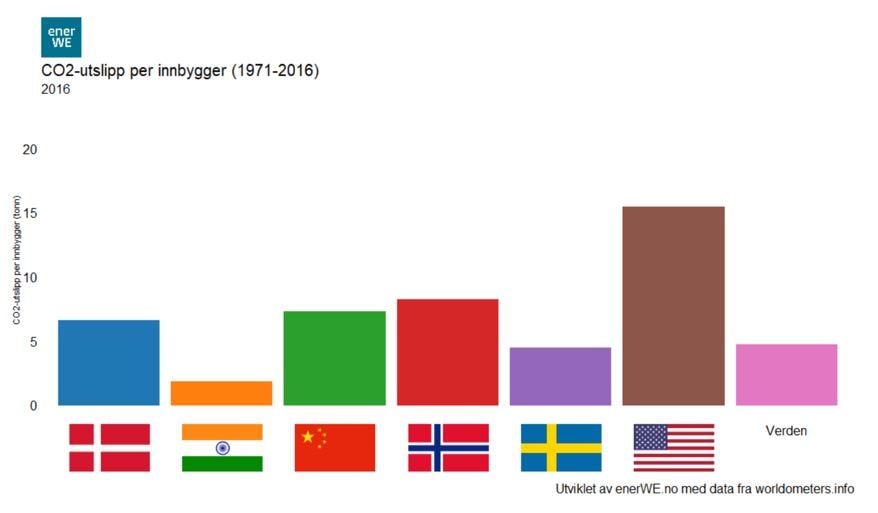
Unlike the EU, why have the Norwegian authorities in their climate plan not imposed transparency about climate impact from Norwegian companies? The EU has both high ambitions and a business community that is prepared for a new and sustainable everyday life. Norway is hesitantly following.

Hanne Thornam
Partner and Head of Climate Change and Sustainability Services at EY Norge
Original first published in Norwegian on E24
It is a good thing we have a government that takes action to stop climate change, and it is positive that large parts of the “climate cure 2030” are covered in the climate plan. But why does the Norwegian authorities not require Norwegian companies to be transparent about climate impact like the EU does?
I am afraid the delay in making such demands will weaken Norwegian competitiveness versus customers and investors in the EU. And unfortunately, I think it has already happened.
Norwegian companies thought they operated sustainably, but that was before “sustainable” did not prove to be sustainable anymore. Before investors and customers demanded documentation and proof of sustainability throughout the value chain.
The EU has identified access to information on environmental impact as a fundamental first step in the green transition. The EU’s plans are clear that this information is fundamental to good investment decisions and purchasing decisions.
The EU has raised the requirements for transparency in several rounds in recent years, and now new criteria are emerging for what can be defined as a sustainable activity is on the horizon. When that takes place many companies are going to be left behind.
In many Norwegian companies the reporting structure does not meet the standards that European investors expect, and will expect. And even fewer are able to document the climate footprint of their products. Documenting environmental impact costs time and money, but “protecting” companies against this cost, while at the same time increasing our requirements, has been of disservice.
Now it’s urgent. Companies in the EU have had stricter requirements for documentation of environmental impact for several years, and the requirements have been tightened in several rounds. French companies have been reporting on climate change for 10 years. British companies must describe how climate is relevant to the business strategy. Norwegian companies have not received new requirements since the Accounting Act was updated in 2013. In other words: Norwegian companies follow unclear and outdated requirements.
The Government’s climate plan mentions that information on climate impact is important, but there are still no concrete measures. The measure is to follow developments in the EU closely, and to enter into a dialogue with the business community. The disservice continues. It is positive that the Ministry of Finance says that some updates will come in the spring and some updates in the autumn based on expected updates in the EU, but we need to be at least in line with the EU’s requirements. It’s starting to get a little too late to play catching up.
European customers and investors will not settle for Norwegian hydropower being automatically sustainable. They will see documentation of how efficient the power plant is in relation to land use, impact on biodiversity, and emissions when the materials were produced, and how much emissions go with the power plant to be destroyed. Or the phone, the electric bike, the car parts, the 3D printer, the clothes and the groceries . . .
While CO2 tracking was remote for a CFO in 2020, it will be a CFO’s everyday life in 2030. When she is to report and document on sustainability, the climate footprint of the entire product life cycle must be able to be documented and reported.
Some of our largest and most international companies have shown more prepared for this, because they have taken the signals that have come from Europe seriously. Some of these will not experience to be undressed when European investors and customers ask if they can document the products’ climate footprint. Recently, we were able to read about a company that experiences a competitive advantage because they have paid attention. We need more of those.
It is neither impressive nor attractive, to simply state that we in Norway were a little late in adapting basic sustainability reporting. Although the government’s proposal for a climate plan and current requirements for sustainability reporting testify to just that. So does the report on the pace of green transition in business, and one of the reports shows that we are behind our neighboring countries.
To put it plainly: the Norwegian authorities should take responsibility for helping Norwegian companies to reduce their climate footprint and create new sustainable solutions, throughout the value chain, including the supply chain. They can do this by preparing the companies for a new sustainable everyday life with CO2 tracking and intensives to have this in place.
Norway is among the countries that emits the most greenhouse gases, our wealth have come with a high per capita consumption. Tracking and requirements for CO2 emissions in the supply chain is the way we can contribute to a green shift, in for example China. The EU is planning CO2-based trade barriers, and we must be ready to document that our products are climate-friendly enough for the EU.
That the state is leading the way with greener procurement’s using a combination of lashes and carrots is good. But it may seem as if the elected representatives underestimate the business community’s willingness and ability to adapt. Many people want to be a part of the shift so that they too can contribute to a greener planet and a better life for future generations. But Norwegian companies need predictability to make the changes, and they must be able to expect that.
Norwegian business needs that we as a nation is as offensive as the EU in order not to lose opportunities to European competitors, and it is urgent. If not, it will cost us share value, jobs and loss in Norway’s overall competitiveness.




Comments are closed.